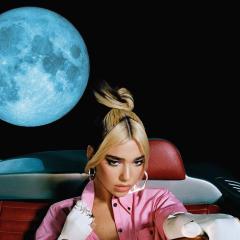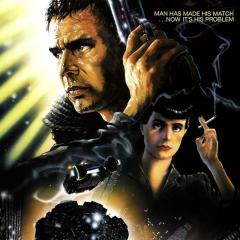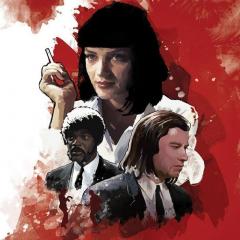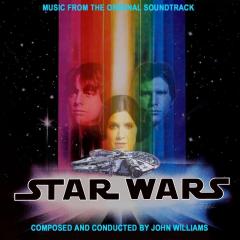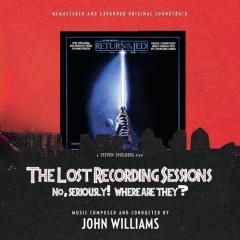-
Posts
5,000 -
Joined
-
Last visited
-
Days Won
4
Reputation Activity
-
 Docteur Qui got a reaction from Richard Penna in Joe Kraemer: “I haven’t scored a single mainstream Hollywood movie since ‘Rogue Nation’”
Docteur Qui got a reaction from Richard Penna in Joe Kraemer: “I haven’t scored a single mainstream Hollywood movie since ‘Rogue Nation’”
Coming to this thread a bit late, but I will say that as much as I love a good old fashioned traditional score with colourful orchestration etc... they're hardly appropriate for most films these days. And the shift in trends is hardly the fault of any individual composer. Some people here are accusing hardworking composers of being talentless hacks, or depicting studio executives and directors as classless, tasteless buffoons that wouldn't know good music if it bit them in the ass. It completely misses the point of filmmaking as a collaborative process, guided by an overarching aesthetic but largely dominated by the pursuit of major profit. You can dislike the music all you want, but it's not the fault of any one person or group of people. It's the result in changing processes all through filmmaking, all of which impact one another including but not limited to:
- Studio trends that favour fewer but much larger-budgeted films, requiring a great deal of managing, re-editing, reshoots, rewrites etc etc
- Subsequently far less mid-budget films wherein creatives have more freedom in their aesthetic choices
- Advancement in editing techniques, essentially meaning that films have a rough assembly on the fly very early in the process, essentially removing much of the traditional post-production process
- Music editors assembling temp scores early in the process, effectively eschewing the spotting process and limiting composer autonomy and originality
- Advancement in digital music production software that allow for rapid turnarounds, quick revision (and more frequent rejection) of cues
- The increased sophistication of sound effect and sound design technology and techniques, and use of those techniques in place of music
- Aesthetic choice of the director (who is running the show remember, under guidance from studios)
- Audience preferences (pre-screening regularly impacts musical aesthetic choice)
I could go on, but I get a bit grumpy when I see people accusing modern composers of being lazy or untalented. The vast majority of them are in a job that doesn't remotely resemble what Williams, and Goldsmith etc were/are doing. And some, like Elfman and JNH have had to pivot massively to stay employed. Don't get me wrong, I have issues with Zimmer's production-line style of composing, which exploits composers and composer-hopefuls and more often than not produces cookie-cutter music that could be from or in any film. But that's the reality of filmmaking, not a conscious decision on the composer's part. The person who gets the gig isn't being chosen because they have mastery of orchestration or tonality, it's because they get the job done on time and on budget. As film score fans we have very specific and refined tastes in music, but that's often limited to the music as it exists in a vacuum, heavily influenced by our past emotional experiences with that music.
-
 Docteur Qui got a reaction from JTN in Joe Kraemer: “I haven’t scored a single mainstream Hollywood movie since ‘Rogue Nation’”
Docteur Qui got a reaction from JTN in Joe Kraemer: “I haven’t scored a single mainstream Hollywood movie since ‘Rogue Nation’”
Coming to this thread a bit late, but I will say that as much as I love a good old fashioned traditional score with colourful orchestration etc... they're hardly appropriate for most films these days. And the shift in trends is hardly the fault of any individual composer. Some people here are accusing hardworking composers of being talentless hacks, or depicting studio executives and directors as classless, tasteless buffoons that wouldn't know good music if it bit them in the ass. It completely misses the point of filmmaking as a collaborative process, guided by an overarching aesthetic but largely dominated by the pursuit of major profit. You can dislike the music all you want, but it's not the fault of any one person or group of people. It's the result in changing processes all through filmmaking, all of which impact one another including but not limited to:
- Studio trends that favour fewer but much larger-budgeted films, requiring a great deal of managing, re-editing, reshoots, rewrites etc etc
- Subsequently far less mid-budget films wherein creatives have more freedom in their aesthetic choices
- Advancement in editing techniques, essentially meaning that films have a rough assembly on the fly very early in the process, essentially removing much of the traditional post-production process
- Music editors assembling temp scores early in the process, effectively eschewing the spotting process and limiting composer autonomy and originality
- Advancement in digital music production software that allow for rapid turnarounds, quick revision (and more frequent rejection) of cues
- The increased sophistication of sound effect and sound design technology and techniques, and use of those techniques in place of music
- Aesthetic choice of the director (who is running the show remember, under guidance from studios)
- Audience preferences (pre-screening regularly impacts musical aesthetic choice)
I could go on, but I get a bit grumpy when I see people accusing modern composers of being lazy or untalented. The vast majority of them are in a job that doesn't remotely resemble what Williams, and Goldsmith etc were/are doing. And some, like Elfman and JNH have had to pivot massively to stay employed. Don't get me wrong, I have issues with Zimmer's production-line style of composing, which exploits composers and composer-hopefuls and more often than not produces cookie-cutter music that could be from or in any film. But that's the reality of filmmaking, not a conscious decision on the composer's part. The person who gets the gig isn't being chosen because they have mastery of orchestration or tonality, it's because they get the job done on time and on budget. As film score fans we have very specific and refined tastes in music, but that's often limited to the music as it exists in a vacuum, heavily influenced by our past emotional experiences with that music.
-
 Docteur Qui got a reaction from JNHFan2000 in Joe Kraemer: “I haven’t scored a single mainstream Hollywood movie since ‘Rogue Nation’”
Docteur Qui got a reaction from JNHFan2000 in Joe Kraemer: “I haven’t scored a single mainstream Hollywood movie since ‘Rogue Nation’”
Coming to this thread a bit late, but I will say that as much as I love a good old fashioned traditional score with colourful orchestration etc... they're hardly appropriate for most films these days. And the shift in trends is hardly the fault of any individual composer. Some people here are accusing hardworking composers of being talentless hacks, or depicting studio executives and directors as classless, tasteless buffoons that wouldn't know good music if it bit them in the ass. It completely misses the point of filmmaking as a collaborative process, guided by an overarching aesthetic but largely dominated by the pursuit of major profit. You can dislike the music all you want, but it's not the fault of any one person or group of people. It's the result in changing processes all through filmmaking, all of which impact one another including but not limited to:
- Studio trends that favour fewer but much larger-budgeted films, requiring a great deal of managing, re-editing, reshoots, rewrites etc etc
- Subsequently far less mid-budget films wherein creatives have more freedom in their aesthetic choices
- Advancement in editing techniques, essentially meaning that films have a rough assembly on the fly very early in the process, essentially removing much of the traditional post-production process
- Music editors assembling temp scores early in the process, effectively eschewing the spotting process and limiting composer autonomy and originality
- Advancement in digital music production software that allow for rapid turnarounds, quick revision (and more frequent rejection) of cues
- The increased sophistication of sound effect and sound design technology and techniques, and use of those techniques in place of music
- Aesthetic choice of the director (who is running the show remember, under guidance from studios)
- Audience preferences (pre-screening regularly impacts musical aesthetic choice)
I could go on, but I get a bit grumpy when I see people accusing modern composers of being lazy or untalented. The vast majority of them are in a job that doesn't remotely resemble what Williams, and Goldsmith etc were/are doing. And some, like Elfman and JNH have had to pivot massively to stay employed. Don't get me wrong, I have issues with Zimmer's production-line style of composing, which exploits composers and composer-hopefuls and more often than not produces cookie-cutter music that could be from or in any film. But that's the reality of filmmaking, not a conscious decision on the composer's part. The person who gets the gig isn't being chosen because they have mastery of orchestration or tonality, it's because they get the job done on time and on budget. As film score fans we have very specific and refined tastes in music, but that's often limited to the music as it exists in a vacuum, heavily influenced by our past emotional experiences with that music.
-
 Docteur Qui got a reaction from Tom Guernsey in Joe Kraemer: “I haven’t scored a single mainstream Hollywood movie since ‘Rogue Nation’”
Docteur Qui got a reaction from Tom Guernsey in Joe Kraemer: “I haven’t scored a single mainstream Hollywood movie since ‘Rogue Nation’”
Coming to this thread a bit late, but I will say that as much as I love a good old fashioned traditional score with colourful orchestration etc... they're hardly appropriate for most films these days. And the shift in trends is hardly the fault of any individual composer. Some people here are accusing hardworking composers of being talentless hacks, or depicting studio executives and directors as classless, tasteless buffoons that wouldn't know good music if it bit them in the ass. It completely misses the point of filmmaking as a collaborative process, guided by an overarching aesthetic but largely dominated by the pursuit of major profit. You can dislike the music all you want, but it's not the fault of any one person or group of people. It's the result in changing processes all through filmmaking, all of which impact one another including but not limited to:
- Studio trends that favour fewer but much larger-budgeted films, requiring a great deal of managing, re-editing, reshoots, rewrites etc etc
- Subsequently far less mid-budget films wherein creatives have more freedom in their aesthetic choices
- Advancement in editing techniques, essentially meaning that films have a rough assembly on the fly very early in the process, essentially removing much of the traditional post-production process
- Music editors assembling temp scores early in the process, effectively eschewing the spotting process and limiting composer autonomy and originality
- Advancement in digital music production software that allow for rapid turnarounds, quick revision (and more frequent rejection) of cues
- The increased sophistication of sound effect and sound design technology and techniques, and use of those techniques in place of music
- Aesthetic choice of the director (who is running the show remember, under guidance from studios)
- Audience preferences (pre-screening regularly impacts musical aesthetic choice)
I could go on, but I get a bit grumpy when I see people accusing modern composers of being lazy or untalented. The vast majority of them are in a job that doesn't remotely resemble what Williams, and Goldsmith etc were/are doing. And some, like Elfman and JNH have had to pivot massively to stay employed. Don't get me wrong, I have issues with Zimmer's production-line style of composing, which exploits composers and composer-hopefuls and more often than not produces cookie-cutter music that could be from or in any film. But that's the reality of filmmaking, not a conscious decision on the composer's part. The person who gets the gig isn't being chosen because they have mastery of orchestration or tonality, it's because they get the job done on time and on budget. As film score fans we have very specific and refined tastes in music, but that's often limited to the music as it exists in a vacuum, heavily influenced by our past emotional experiences with that music.
-
 Docteur Qui reacted to Koray Savas in Joe Kraemer: “I haven’t scored a single mainstream Hollywood movie since ‘Rogue Nation’”
Docteur Qui reacted to Koray Savas in Joe Kraemer: “I haven’t scored a single mainstream Hollywood movie since ‘Rogue Nation’”
Lorne Balfe continues to have a career, not because of Hans Zimmer, but because he does whatever producers/directors ask of him.
Its as simple as that. The industry is a business. Hans Zimmer isn’t to blame for his sound being heard everywhere. It’s producers/directors that ask for that sound.
Familiarity = profitability.
-
 Docteur Qui reacted to Goldfinger in Joe Kraemer: “I haven’t scored a single mainstream Hollywood movie since ‘Rogue Nation’”
Docteur Qui reacted to Goldfinger in Joe Kraemer: “I haven’t scored a single mainstream Hollywood movie since ‘Rogue Nation’”
He's been doing some good work with Big Finish and their Doctor Who audio stories.
-
 Docteur Qui reacted to MaxTheHouseelf in Joe Kraemer: “I haven’t scored a single mainstream Hollywood movie since ‘Rogue Nation’”
Docteur Qui reacted to MaxTheHouseelf in Joe Kraemer: “I haven’t scored a single mainstream Hollywood movie since ‘Rogue Nation’”
The fundamental point I think you seem to miss with this view is that, in many fields, women are still extremely underrepresented, not because they are less "talented" (whatever that means) or less women want to do these jobs, but simply because men tend to recommend (and prefer) other men for jobs in the industry in general. This can be observed in almost all fields.
So at this point, I'd say it's a good thing that female composers get high-profile scoring jobs, even if it is just for the sake of being female, because it reduces gender inequality in the first place, and also means that they'll have more clout to make sure other females get into scoring as well.
In the end, very few will be exceptional artists and the majority will be average, just like male composers, simple gaussian statistics. But the factor of inequality, that resulted because of males giving jobs exclusively to males, has been eliminated. That's the point.
I just see a heated discussion with people exchanging their views, without getting into personal insults. This was the standard some years ago, good that this is still possible here, on many places on the internet, it's not.
-
 Docteur Qui reacted to Richard Penna in Joe Kraemer: “I haven’t scored a single mainstream Hollywood movie since ‘Rogue Nation’”
Docteur Qui reacted to Richard Penna in Joe Kraemer: “I haven’t scored a single mainstream Hollywood movie since ‘Rogue Nation’”
Here's what's troubling me in this conversation: you're making a great deal of bold statements/opinions, which you're absolutely entitled to make. No qualms there.
But the problem is that when they're referring to taste, gender-based discussions, etc (and again, you're entitled to those views), it's easy to see how they can be perceived as an insult by someone who enjoys the things of whom you're saying uncharitable things.
The 'fast food' analogy was used by Clemmenson at Filmtracks a while back, and I didn't think it was the best-judged analogy in terms of respecting the tastes of film music fans as a whole. No one should be made to feel that their tastes are inferior, but you're pretty routinely implying just that. It's not hard to imagine some push-back on these statements.
I certainly have issues with some of your statements that I won't go further into (they don't add to the musical discussion) but I fear that if I expressed them, you'd see them as attacks, when really they're just asking you to justify your often strong opinions, and perhaps ask for some basis, which often is lacking, because it's down to opinion. It can be a vicious circle
-
 Docteur Qui reacted to Mephariel in Joe Kraemer: “I haven’t scored a single mainstream Hollywood movie since ‘Rogue Nation’”
Docteur Qui reacted to Mephariel in Joe Kraemer: “I haven’t scored a single mainstream Hollywood movie since ‘Rogue Nation’”
There are so many things wrong with this post.
1. Because some other people are sexist, I can be too.
2. Assumed nobody really likes her music. They are all faking it and just want to give out an award.
3. Assumed she was hired only because of her sex, not because the director was a fan of her music.
4. Claimed others are the ones being sexist without evidence when making tons of sexist statements himself.
5. Assumed everyone has to be a fan of John Williams.
6. Assumed everyone is looking for a John Williams type score.
7. Assumed people don't want to collaborate with someone new and that is not a factor.
8. Assumed John Williams was available and wanted the job.
9. Assumed that Toprak couldn't have intangibles that the director was looking for (speed, synth knowledge, loves Marvel, etc.)
10. Assumed the opinion of "insufficient talent" is fact.
Once again, completely misused the word "talent." How do you even know what Toprak's "talent" level is? People can write better music because they had more experiences and better education. Not necessarily because of talent.
And again, I think you insulted yourself more than anything.
-
 Docteur Qui reacted to Mephariel in Joe Kraemer: “I haven’t scored a single mainstream Hollywood movie since ‘Rogue Nation’”
Docteur Qui reacted to Mephariel in Joe Kraemer: “I haven’t scored a single mainstream Hollywood movie since ‘Rogue Nation’”
I called you out on your sexist remarks and your immaturity as others did. Doesn't matter if you don't talk to me. You don't have a counter anyway and you know it.
-
 Docteur Qui reacted to Holko in Joe Kraemer: “I haven’t scored a single mainstream Hollywood movie since ‘Rogue Nation’”
Docteur Qui reacted to Holko in Joe Kraemer: “I haven’t scored a single mainstream Hollywood movie since ‘Rogue Nation’”
Aren't you the one assuming she doesn't have the talent or didn't get hired because of it?
-
 Docteur Qui reacted to Tom Guernsey in Joe Kraemer: “I haven’t scored a single mainstream Hollywood movie since ‘Rogue Nation’”
Docteur Qui reacted to Tom Guernsey in Joe Kraemer: “I haven’t scored a single mainstream Hollywood movie since ‘Rogue Nation’”
I don't think the thinly veiled sexism about Pinar Toprak is at all necessary. You can like or dislike her music, but that's totally uncalled for.
-
 Docteur Qui got a reaction from Andy in Star Trek: Picard (2020 TV Series)
Docteur Qui got a reaction from Andy in Star Trek: Picard (2020 TV Series)
A fair observation, but I’d argue that Star Wars has always been the more melodramatic of the two franchises, so it doesn’t bother me so much. It is a space opera after all. Star Trek on the other hand was always more cerebral, generally balancing reasoned debate with emotional appeal. It’s why Spock and Kirk were such great counterparts, and Seven and Janeway, Picard and Riker etc. These days just about every character is at risk of an emotional outburst at any given moment.
I felt a bit the same - I started with Voyager and then did TNG, by the time I was done I couldn’t watch DS9 which I regret because a lot of people feel it’s the superior show of that era. I’ve seen a handful of eps, and might give it a go this year.
I recommend pushing through with Discovery if you can, there’s still a lot there to enjoy. The second half of S1 snaps into focus and Jason Isaacs is a highlight. S2 heavily features Captain Pike (Anson Mount) who is phenomenal, a genuinely excellent and very Trek portrayal. It was so successful he’s got his own spin-off coming next month which I can’t wait for. And my favourite character by far is Saru, who, like Pike, brings mountains of classic, classy Trek to the table (and the writers know it). It’s the role Doug Jones was made for and he thankfully gets plenty of screen time over the whole series.
You’ll just have to get past a lot of Burnham, Tilly and Stamets first. I’ve warmed to all three now but they’re definitely the most egregious offenders of the aforementioned emoting.
-
 Docteur Qui got a reaction from Tom Guernsey in Star Trek: Picard (2020 TV Series)
Docteur Qui got a reaction from Tom Guernsey in Star Trek: Picard (2020 TV Series)
A fair observation, but I’d argue that Star Wars has always been the more melodramatic of the two franchises, so it doesn’t bother me so much. It is a space opera after all. Star Trek on the other hand was always more cerebral, generally balancing reasoned debate with emotional appeal. It’s why Spock and Kirk were such great counterparts, and Seven and Janeway, Picard and Riker etc. These days just about every character is at risk of an emotional outburst at any given moment.
I felt a bit the same - I started with Voyager and then did TNG, by the time I was done I couldn’t watch DS9 which I regret because a lot of people feel it’s the superior show of that era. I’ve seen a handful of eps, and might give it a go this year.
I recommend pushing through with Discovery if you can, there’s still a lot there to enjoy. The second half of S1 snaps into focus and Jason Isaacs is a highlight. S2 heavily features Captain Pike (Anson Mount) who is phenomenal, a genuinely excellent and very Trek portrayal. It was so successful he’s got his own spin-off coming next month which I can’t wait for. And my favourite character by far is Saru, who, like Pike, brings mountains of classic, classy Trek to the table (and the writers know it). It’s the role Doug Jones was made for and he thankfully gets plenty of screen time over the whole series.
You’ll just have to get past a lot of Burnham, Tilly and Stamets first. I’ve warmed to all three now but they’re definitely the most egregious offenders of the aforementioned emoting.
-
 Docteur Qui got a reaction from Edmilson in Fantastic Beasts: The Secrets of Dumbledore (2022) by James Newton Howard
Docteur Qui got a reaction from Edmilson in Fantastic Beasts: The Secrets of Dumbledore (2022) by James Newton Howard
Not that I'm defending a mega film studio, but I think this is more indicative an overall trend of franchise films exploiting nostalgia, rather than an isolated ploy by WB in this one instance. You can almost pinpoint when all the major studio executives realised that using the "greatest hits" of a franchise's score history gives the big emotional feelings to fans, and it was around the time Marvel decided that Alan Silvestri wasn't such a bad composer after all and brought him back for The Avengers. All the big movie series are guilty of this, even the last Bond film had the John Barry nostalgia turned up to 11. The fact that movies are now being made by people who were fans of those franchises as children only worsens things.
It's also not helped by the fact that given the current state of the world, fans are much more likely to lap up the safe and the familiar than anything new. Taking risks is not something Hollywood can afford to do these days.
-
 Docteur Qui got a reaction from DarthDementous in Star Trek: Picard (2020 TV Series)
Docteur Qui got a reaction from DarthDementous in Star Trek: Picard (2020 TV Series)
I'm also watching S4 of Discovery in between episodes of Picard. That's another show that has definitely found its stride after a shaky start The cast is great, the storylines get better and better, and the far-future setting proves to be fruitful. But it's lacking something that until recently I couldn't quite put my finger on. It's lacking memorability, and ironically, restraint. I'm always engaged and entertained while watching but nothing seems to stick after I finish an episode. I'm also not a big fan of the sheer amount of gushing emotion that seems to be on display at all times. Picard is a little bit guilty of this as well.
I get that modern film and TV requires a level of emotional verisimilitude these days, but at times it borders on exaggeration. It's gotten to the point where the interesting philosophical conundrums or nifty sci-fi concepts (of which there are many!) are drowned out by emotive, anguished ACTING! There's something to be said about the relative stoicism of the Next Gen shows (including Voyager and DS9), even if the acting bordered on anemic at times. I get that dealing with metaphors for deep and dark human experiences means that the characters are dealing with some heavy emotions. But it's okay to let us imagine how characters might be feeling based on a few gestures or a thousand-yard stare, or a few lines of dialogue. We don't need intense psychological breakdowns and dialogue-heavy interactions every other scene, it's actually a bit exhausting to watch, especially with everything else going on in the world.
-
 Docteur Qui got a reaction from Andy in Star Trek: Picard (2020 TV Series)
Docteur Qui got a reaction from Andy in Star Trek: Picard (2020 TV Series)
I'm also watching S4 of Discovery in between episodes of Picard. That's another show that has definitely found its stride after a shaky start The cast is great, the storylines get better and better, and the far-future setting proves to be fruitful. But it's lacking something that until recently I couldn't quite put my finger on. It's lacking memorability, and ironically, restraint. I'm always engaged and entertained while watching but nothing seems to stick after I finish an episode. I'm also not a big fan of the sheer amount of gushing emotion that seems to be on display at all times. Picard is a little bit guilty of this as well.
I get that modern film and TV requires a level of emotional verisimilitude these days, but at times it borders on exaggeration. It's gotten to the point where the interesting philosophical conundrums or nifty sci-fi concepts (of which there are many!) are drowned out by emotive, anguished ACTING! There's something to be said about the relative stoicism of the Next Gen shows (including Voyager and DS9), even if the acting bordered on anemic at times. I get that dealing with metaphors for deep and dark human experiences means that the characters are dealing with some heavy emotions. But it's okay to let us imagine how characters might be feeling based on a few gestures or a thousand-yard stare, or a few lines of dialogue. We don't need intense psychological breakdowns and dialogue-heavy interactions every other scene, it's actually a bit exhausting to watch, especially with everything else going on in the world.
-
 Docteur Qui reacted to Naïve Old Fart in James Bond is better than everything
Docteur Qui reacted to Naïve Old Fart in James Bond is better than everything
It's among the more kitsch of Bond films, but I've got a sneaky regard, for DIE ANOTHER DAY. Yes, it has some of the worst effects you'll ever see, but it's got a great pre-title sequence, and the score (especially the sword fight) is top notch.
-
 Docteur Qui reacted to Andy in Star Trek: Picard (2020 TV Series)
Docteur Qui reacted to Andy in Star Trek: Picard (2020 TV Series)
I could not agree more. There is so little discussion around the interwebs regarding this show, and it's the most fun I've had with Trek in a long long time. The characters went from broken and wretched (S1) to likable flawed family (S2). Elnor just has to be brought back. We've not yet seen this lovable character's full potential to be the next best thing, Spock crossed with Legolas.
I am a little baffled with another iteration of Soong (Whose naming always bothered me as it was just too close to Khan Noonien Singh.) and his daughter, but I imagine they're laying the genetic groundwork for their descendants.
But the one thing it has brought back is Adventure. It's not just discussion after discussion. There's momentum, fun, real juicy dramatic beats. I really look forward to Thursdays,
-
 Docteur Qui got a reaction from Andy in Star Trek: Picard (2020 TV Series)
Docteur Qui got a reaction from Andy in Star Trek: Picard (2020 TV Series)
Another solid episode. It's a shame no-one seems to be watching this season (not that I'm surprised after S1), because it's a huge improvement.
I mean it's still fairly ridiculous, but all the elements are working together well. Raffi and Seven play so well against each other and the actors have oodles of chemistry. Agnes now harbouring the Borg Queen in her mind is a great plot point and a good use of both characters. Rios continues to be charismatic as hell (even if he hasn't got much to do); in fact all three of the "new" characters are a huge step up from their thin portrayals in S1. I just miss Evan Evagora, the gorgeous Australian actor who plays Elnor.
I think I'm mostly surprised at how focused it all feels even considering the multiple threads at play. So far we have Picard and his ancestor being manipulated by Q, the Watcher character, the Borg Queen with her own agenda, another Soong portrayed by Brent Spiner plus his daughter, plus the various character arcs of Raffi, Seven and to a lesser extent Rios at play. It's a lot but it doesn't seem nearly as disparate or bloated as it should. I just hope it doesn't all come crashing down.
-
 Docteur Qui got a reaction from Tom Guernsey in Star Trek: Picard (2020 TV Series)
Docteur Qui got a reaction from Tom Guernsey in Star Trek: Picard (2020 TV Series)
Another solid episode. It's a shame no-one seems to be watching this season (not that I'm surprised after S1), because it's a huge improvement.
I mean it's still fairly ridiculous, but all the elements are working together well. Raffi and Seven play so well against each other and the actors have oodles of chemistry. Agnes now harbouring the Borg Queen in her mind is a great plot point and a good use of both characters. Rios continues to be charismatic as hell (even if he hasn't got much to do); in fact all three of the "new" characters are a huge step up from their thin portrayals in S1. I just miss Evan Evagora, the gorgeous Australian actor who plays Elnor.
I think I'm mostly surprised at how focused it all feels even considering the multiple threads at play. So far we have Picard and his ancestor being manipulated by Q, the Watcher character, the Borg Queen with her own agenda, another Soong portrayed by Brent Spiner plus his daughter, plus the various character arcs of Raffi, Seven and to a lesser extent Rios at play. It's a lot but it doesn't seem nearly as disparate or bloated as it should. I just hope it doesn't all come crashing down.
-
 Docteur Qui got a reaction from Giftheck in Star Trek: Picard (2020 TV Series)
Docteur Qui got a reaction from Giftheck in Star Trek: Picard (2020 TV Series)
Another solid episode. It's a shame no-one seems to be watching this season (not that I'm surprised after S1), because it's a huge improvement.
I mean it's still fairly ridiculous, but all the elements are working together well. Raffi and Seven play so well against each other and the actors have oodles of chemistry. Agnes now harbouring the Borg Queen in her mind is a great plot point and a good use of both characters. Rios continues to be charismatic as hell (even if he hasn't got much to do); in fact all three of the "new" characters are a huge step up from their thin portrayals in S1. I just miss Evan Evagora, the gorgeous Australian actor who plays Elnor.
I think I'm mostly surprised at how focused it all feels even considering the multiple threads at play. So far we have Picard and his ancestor being manipulated by Q, the Watcher character, the Borg Queen with her own agenda, another Soong portrayed by Brent Spiner plus his daughter, plus the various character arcs of Raffi, Seven and to a lesser extent Rios at play. It's a lot but it doesn't seem nearly as disparate or bloated as it should. I just hope it doesn't all come crashing down.
-
 Docteur Qui reacted to Dr. Rick in Star Trek: Picard (2020 TV Series)
Docteur Qui reacted to Dr. Rick in Star Trek: Picard (2020 TV Series)
It was so weird (and cool) to see Brian Quinn from Impractical Jokers make a cameo in last week's episode! Especially since he was being serious and not joking around like his main gig. It's ironic that his nickname on Jokers is "Q" and he shows up on another show with a character of the same name. Too bad they didn't interact with each other on screen.
https://www.trutv.com/shows/impractical-jokers
-
 Docteur Qui reacted to mrbellamy in Fantastic Beasts: The Secrets of Dumbledore (2022) by James Newton Howard
Docteur Qui reacted to mrbellamy in Fantastic Beasts: The Secrets of Dumbledore (2022) by James Newton Howard
Gambon's an exceptional actor who generally made a fine Dumbledore, but he was just a little erratic because of the nature of the character's changing role in the stories and also the director changes. I always felt Gambon was highly aware what movie he was in each time out as any good film actor should be, but sometimes at the expense of the Dumbledore I loved in the books. I find it interesting how he's quirkier in Azkaban, louder and more aggressive in Goblet, and in the Yates movies he kinda leveled out....it almost felt like each director had a different take on Dumbledore more than any of the other characters.
The main problem I have is it's just hard to look past the simple fact that Gambon wasn't counseling little Harry in those first two. A little bit of the power is taken away there through no fault of his own. I would have liked to see him from the beginning but I also think Harris could have been interesting in the later ones.
-
 Docteur Qui reacted to mstrox in Fantastic Beasts: The Secrets of Dumbledore (2022) by James Newton Howard
Docteur Qui reacted to mstrox in Fantastic Beasts: The Secrets of Dumbledore (2022) by James Newton Howard
I read the books back in the day but don’t have a particular attachment to them. For me, Gambon was an excellent Dumbledore for the movies he was in. Richard Harris’s performance never interested me in the first two, but the first movies were so generally bland that I don’t know if that’s his deal or Columbus’s.



